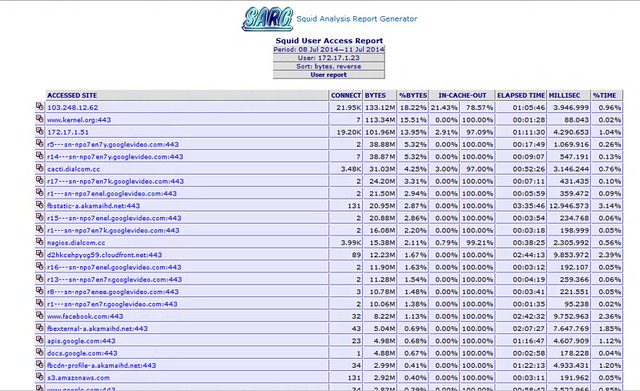How to analyze Squid logs with SARG log analyzer on CentOS
This article was originally written for xmodulo.
Squid provides many useful proxy features such as caching, access control, anti-virus, load balancing, authentication, rate-limiting, and so on. However, analyzing a raw Squid log file is not straightforward. For example, how could you analyze the time stamps and the number of hits in the following Squid log?
1404788984.429 1162 172.17.1.23 TCP_MISS/302 436 GET http://facebook.com/ - DIRECT/173.252.110.27 text/html 1404788985.046 12416 172.17.1.23 TCP_MISS/200 4169 CONNECT stats.pusher.com:443 - DIRECT/173.255.223.127 - 1404788986.124 174 172.17.1.23 TCP_MISS/200 955 POST http://ocsp.digicert.com/ - DIRECT/117.18.237.29 application/ocsp-response 1404788989.738 342 172.17.1.23 TCP_MISS/200 3890 CONNECT www.google.com:443 - DIRECT/74.125.200.106 - 1404788989.757 226 172.17.1.23 TCP_MISS/200 942 POST http://clients1.google.com/ocsp - DIRECT/74.125.200.113 application/ocsp-response 1404788990.839 3939 172.17.1.23 TCP_MISS/200 78944 CONNECT fbstatic-a.akamaihd.net:443 - DIRECT/184.26.162.35 - 1404788990.846 2148 172.17.1.23 TCP_MISS/200 118947 CONNECT fbstatic-a.akamaihd.net:443 - DIRECT/184.26.162.35 - 1404788990.849 2151 172.17.1.23 TCP_MISS/200 76809 CONNECT fbstatic-a.akamaihd.net:443 - DIRECT/184.26.162.35 - 1404788991.140 611 172.17.1.23 TCP_MISS/200 110073 CONNECT fbstatic-a.akamaihd.net:443 - DIRECT/184.26.162.35 –
That is when SARG (or Squid Analysis Report Generator) comes in handy. In a nutshell, SARG is a web based tool that creates reports from Squid logs. SARG provides system admins with an easy-to-understand view of network traffic handled by Squid. What's more, it is very easy to set up and maintain.
In the following tutorial, we show how to set up SARG on CentOS platform.
We start the process by installing necessary dependencies using yum.
# yum install gcc make wget httpd crond
Necessary services are started and loaded at startup.
CentOS/RHEL 6:
# service httpd start
# service crond start
# chkconfig httpd on
# chkconfig crond on
# service crond start
# chkconfig httpd on
# chkconfig crond on
CentOS/RHEL 7:
# systemctl start httpd.service
# systemctl start crond.service
# systemctl enable httpd.service
# systemctl enable crond.service
# systemctl start crond.service
# systemctl enable httpd.service
# systemctl enable crond.service
Now we download and extract SARG.
# wget http://downloads.sourceforge.net/project/sarg/sarg/sarg-2.3.8/sarg-2.3.8.tar.gz?
# tar zxvf sarg-2.3.8.tar.gz
# cd sarg-2.3.8
# tar zxvf sarg-2.3.8.tar.gz
# cd sarg-2.3.8
NOTE: For 64-bit Linux, the source code in log.c needs to be patched as follows.
1
2
3
4
5
6
7
8
9
10
11
12
| 1506c1506< if (fprintf(ufile->file, "%s\t%s\t%s\t%s\t%"PRIi64"\t%s\t%ld\t%s\n",dia,hora,ip,url,nbytes,code,elap_time,smartfilter)<=0) {---> if (fprintf(ufile->file, "%s\t%s\t%s\t%s\t%"PRIi64"\t%s\t%ld\t%s\n",dia,hora,ip,url,(int64_t)nbytes,code,elap_time,smartfilter)<=0) {1513c1513< fprintf(fp_log, "%s\t%s\t%s\t%s\t%s\t%"PRIi64"\t%s\t%ld\t%s\n",dia,hora,user,ip,url,nbytes,code,elap_time,smartfilter);---> fprintf(fp_log, "%s\t%s\t%s\t%s\t%s\t%"PRIi64"\t%s\t%ld\t%s\n",dia,hora,user,ip,url,(int64_t)nbytes,code,elap_time,smartfilter);1564c1564< printf("LEN=\t%"PRIi64"\n",nbytes);---> printf("LEN=\t%"PRIi64"\n",(int64_t)nbytes); |
Go ahead and build/install SARG as follows.
# ./configure
# make
# make install
# make
# make install
After SARG is installed, the configuration file can be modified to match your requirements. The following is one example of SARG configuration.
# vim /usr/local/etc/sarg.conf
1
2
3
4
5
6
| access_log /var/log/squid/access.logtemporary_dir /tmpoutput_dir /var/www/html/squid-reportsdate_format e ## We use Europian DD-MM-YYYY format here #### we don’t want multiple reports for single day/week/month ##overwrite_report yes |
Now it's time for a test run. We run sarg command in debug mode to find whether there is any error in the configuration.
# sarg -x
If all goes well, sarg should analyze Squid logs, and create reports in /var/www/html/squid-reports. The reports should be visible in a web browser using the address http://<server-IP>/squid-reports/
SARG can be used to create daily, weekly and monthly reports. Time range can be specified using the "-d" parameter with possible values in the form of day-n, week-n or month-n, where n is the number of days/weeks/months to jump backward. For example, with week-1, SARG will generate a report for the previous week. With day-2, SARG will prepare reports for the previous two days.
As a demonstration, we will prepare a cron job to run SARG daily.
# vim /etc/cron.daily/sarg
1
2
| #!/bin/sh/usr/local/bin/sarg -d day-1 |
The file needs a execution permission.
# chmod 755 /usr/local/bin/sarg
Now SARG should prepare daily reports about Squid-managed traffic. These reports can easily be accessed from the SARG web interface.
To sum up, SARG is a web based tool that analyzes Squid logs and presents the analysis in an informative way. System admins can leverage SARG to monitor what sites are being accessed, and to keep track of top visited sites and top users. This tutorial covers a working configuration for SARG. You can customize the configuration even further to match your requirements.
Hope this helps.


Comments
Post a Comment